
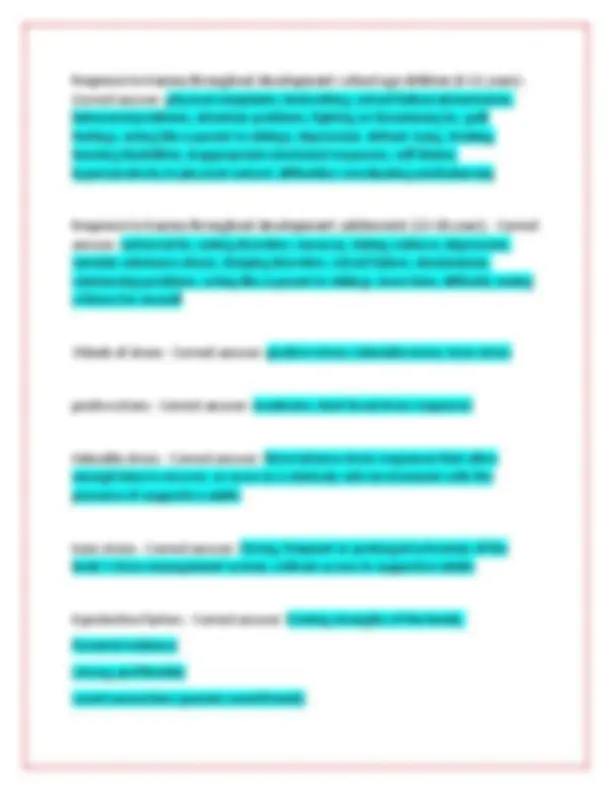
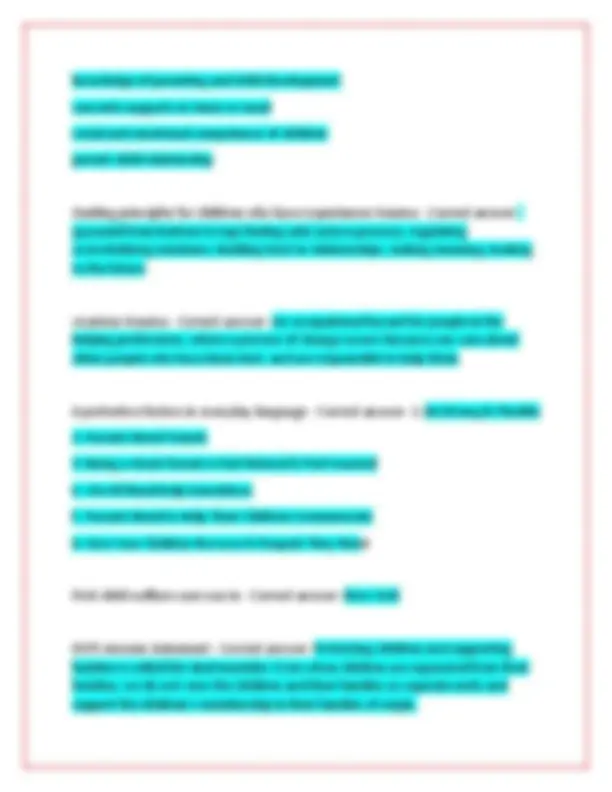
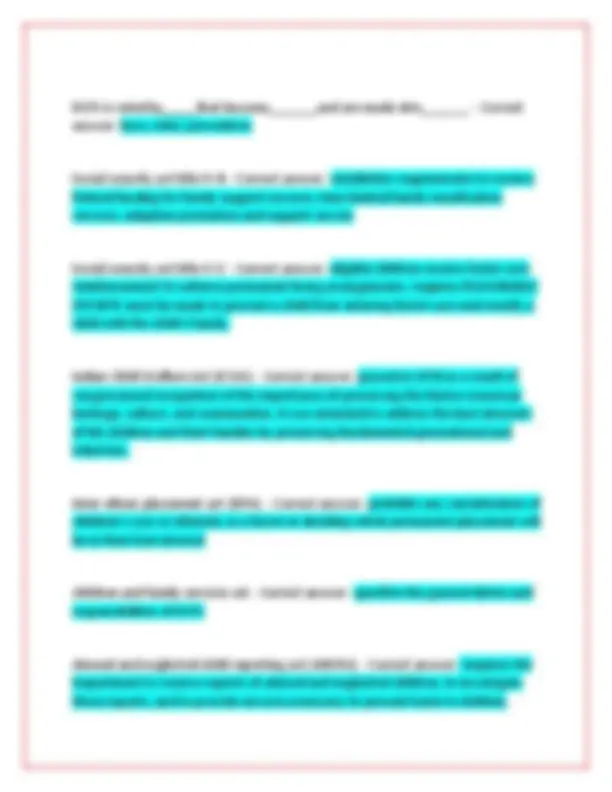
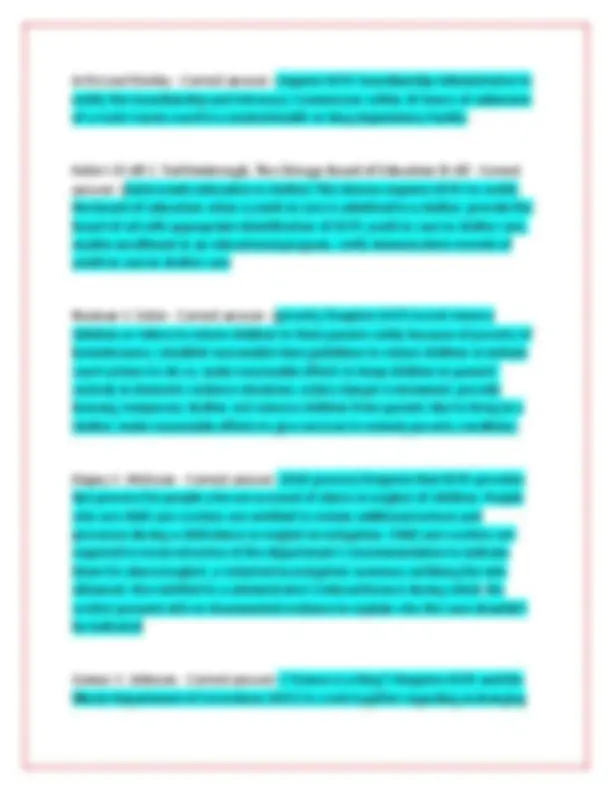
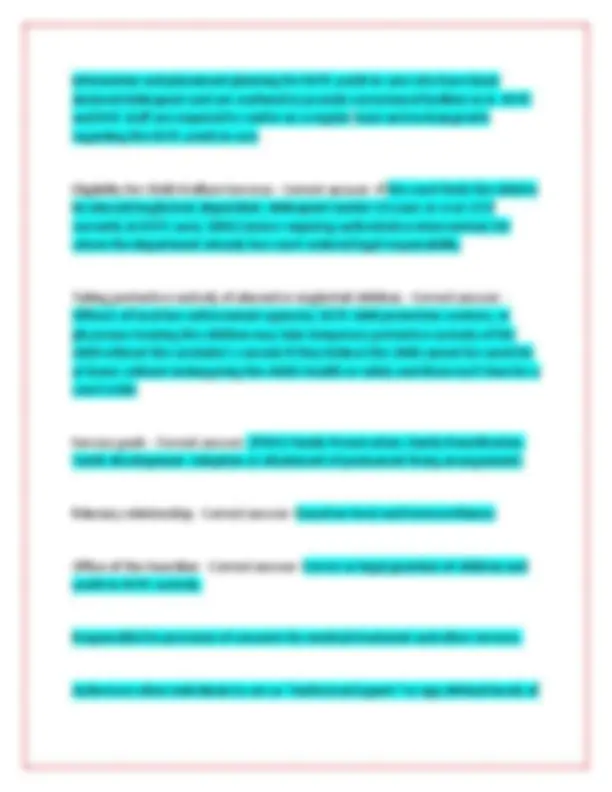
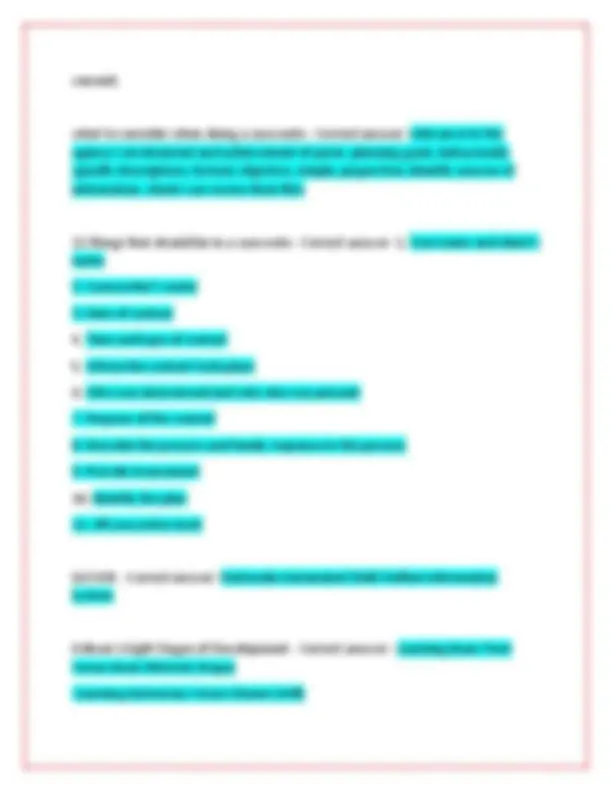
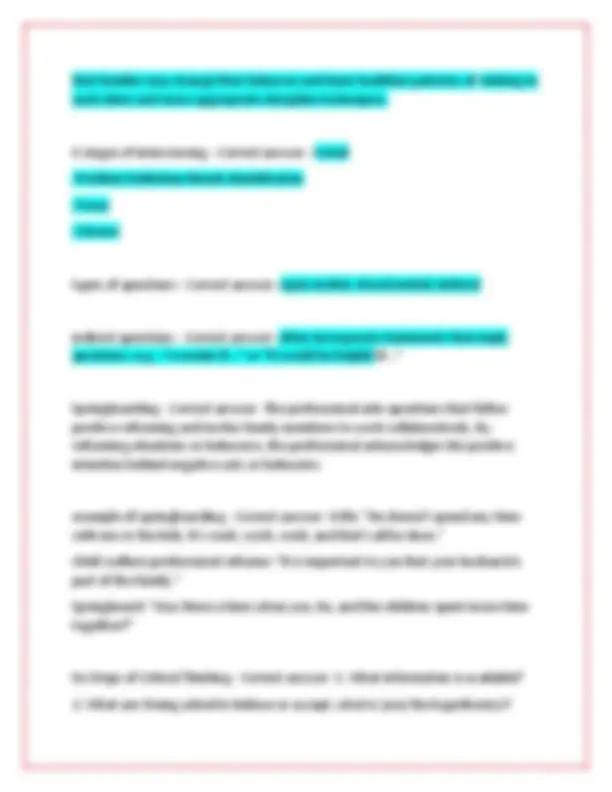
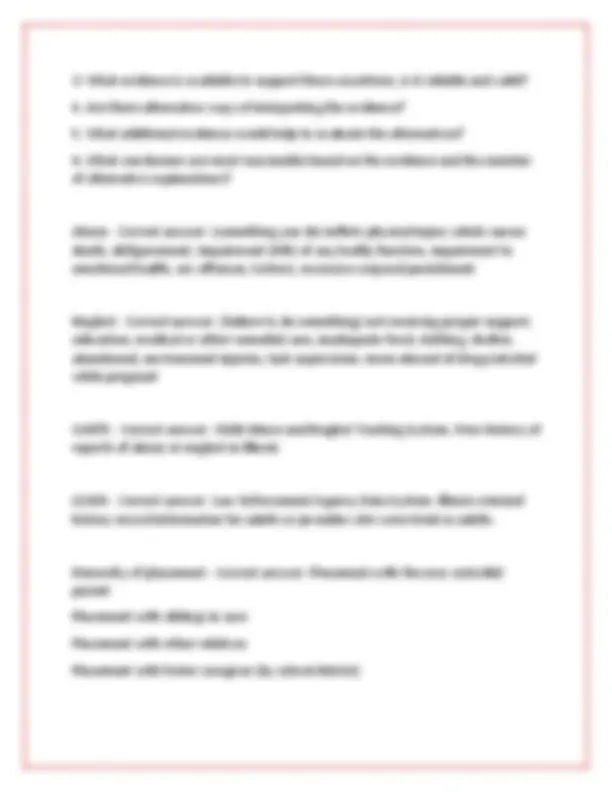
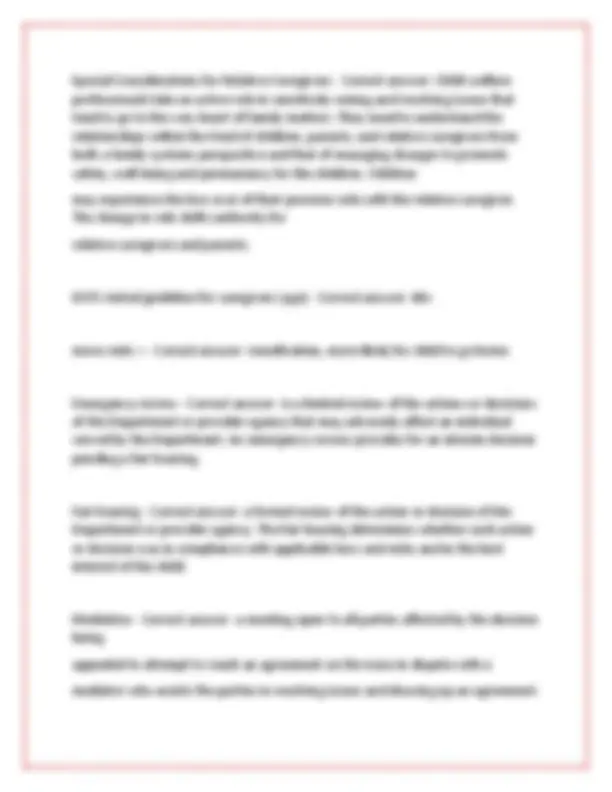
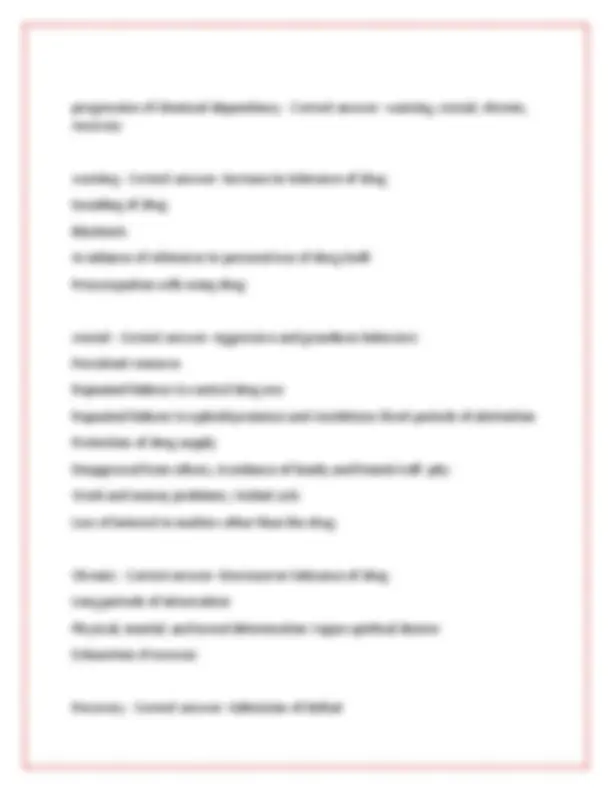
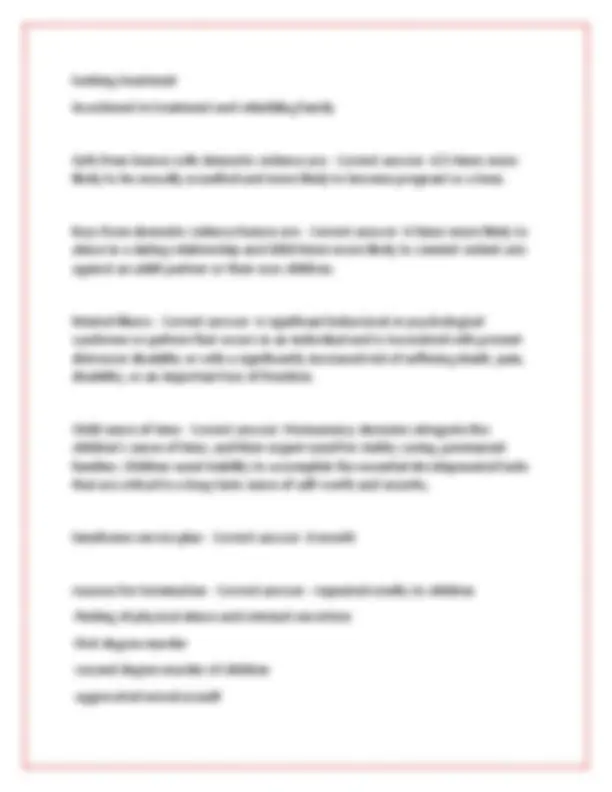
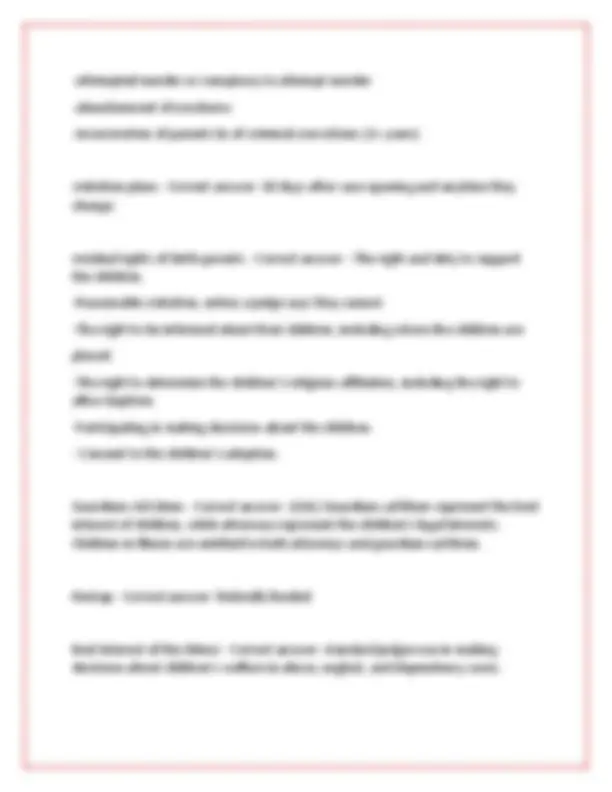
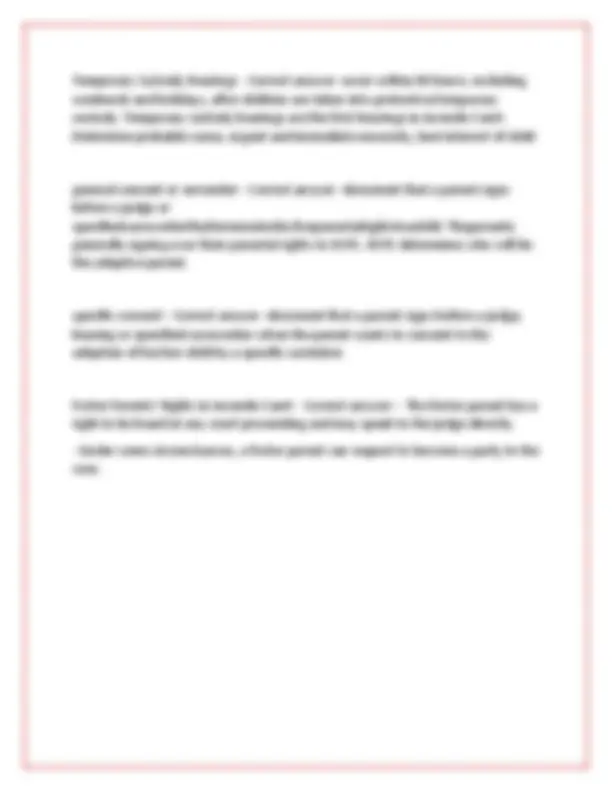


Study with the several resources on Docsity

Earn points by helping other students or get them with a premium plan


Prepare for your exams
Study with the several resources on Docsity

Earn points to download
Earn points by helping other students or get them with a premium plan
Community
Ask the community for help and clear up your study doubts
Discover the best universities in your country according to Docsity users
Free resources
Download our free guides on studying techniques, anxiety management strategies, and thesis advice from Docsity tutors
In child welfare, "practice" is - Correct answer -the means by which individuals and families are helped to change their bxs and circumstances Illinois Core Practice Model - Correct answer -anchored in a Family Centered, trauma informed, and strength based approach, often times referred to as FTS 9 Core Child Welfare Practices - Correct answer --agent of change -form a helping relationship with the child and his/her family -conduct initial and ongoing assessment -provide information about the impact of trauma -advocate -provide behavioral support -linkage to appropriate services
Typology: Exams
1 / 21

This page cannot be seen from the preview
Don't miss anything!














In child welfare, "practice" is - Correct answer - the means by which individuals and families are helped to change their bxs and circumstances Illinois Core Practice Model - Correct answer - anchored in a Family Centered, trauma informed, and strength based approach, often times referred to as FTS 9 Core Child Welfare Practices - Correct answer --agent of change
knowledge of parenting and child development concrete supports in times or need social and emotional competence of children parent-child relationship Guiding principles for children who have experiences trauma - Correct answer - (pyramid from bottom to top) feeling safe (active process), regulating overwhelming emotions, building trust in relationships, making meaning, looking to the future vicarious trauma - Correct answer - An occupational hazard for people in the helping professions, where a process of change occurs because you care about other people who have been hurt, and are responsible to help them. 6 protective factors in everyday language - Correct answer - 1. Be Strong & Flexible
DCFS is ruled by that become and are made into. - Correct answer - laws, rules, procedures Social security act title IV-B - Correct answer - establishes requirements to receive federal funding for family support services, time limited family reunification services, adoption promotion and support servies Social security act title IV-E - Correct answer - eligible children receive foster care reimbursement to achieve permanent living arrangements. requires REASONABLE EFFORTS must be made to prevent a child from entering foster care and reunify a child with the child's family. Indian Child Welfare Act (ICWA) - Correct answer - passed in 1978 as a result of congressional recognition of the importance of preserving the Native American heritage, culture, and communities. It was intended to address the best interests of NA children and their families by preserving fundamental generational and tribal ties. Inter-ethnic placement act (IEPA) - Correct answer - prohibits any consideration of children's race or ethnicity as a factor in deciding which permanent placement will be in their best interest children and family services act - Correct answer - specifies the general duties and responsibilities of DCFS Abused and neglected child reporting act (ANCRA) - Correct answer - requires the Department to receive reports of abused and neglected children, to investigate these reports, and to provide services necessary to prevent harm to children.
together then frequent contact by phone and mail are encouraged and visitation twice a month Bates V. McDonald - Correct answer - (Norman Bates needs to see his mom) Requires DCFS to provide weekly visits for children with a "return home" goal, arrange visits unless harmful to children, begin visits after 2 weeks after dcfs assumes custody, provide stats info on visit, resolve transportation or other issues that make visit difficult to arrange BH V. McDonald - Correct answer - (standard of care/ limits caseload) Requires DCFS to meet a standard of care that protects children in DCFS custody from foreseeable and preventable harm, provides minimally adequate health care including mental health, provides minimally adequate training education, and services to enable children to secure their own safety and provide for their needs. Burgos V. Suter - Correct answer - Requires DCFS to provide services in Spanish for Spanish-speaking clients. Maintain/hire a minimum # of Spanish speaking employees, provides a 24/7 # to assist Spanish speaking clients, provide documents in Spanish, provide services in Spanish, place Spanish speaking children of Spanish speaking Hispanic clients with Spanish speaking foster parents, ensure that bilingual caseworkers shall not have a bigger caseload than those that aren't Hill V. Erickson - Correct answer - (pregnant belly = hill) requires dcfs to provide adequate placement and programming for dcfs youth in care who are pregnant and/or parenting, appoint full time teen parent coordinators, consult with quality assurance, ACR units, and training units
In Re Lee/Wesley - Correct answer - requires DCFS Guardianship Administrator to notify the Guardianship and Advocacy Commission within 24 hours of admission of a Cook County ward to a mental health or drug dependency facility Katie I. Et All V. Ted Kimbrough, The Chicago Board of Education Et All - Correct answer - (Katie needs education in shelter) This decree requires DCFS to: notify the board of education when a youth in care is admitted to a shelter, provide the board of ed with appropriate identification of DCFS youth in care in shelter care, enable enrollment in an educational program, verify immunization records of youth in care in shelter care Norman V. Suter - Correct answer - (poverty) Requires DCFS to not remove children or refuse to return children to their parents solely because of poverty of homelessness, establish reasonable time guidelines to return children or initiate court actions to do so, make reasonable efforts to keep children in parents' custody in domestic violence situations, unless danger is imminent, provide housing, temporary shelter, not remove children from parents due to living in a shelter, make reasonable efforts to give services to remedy poverty conditions Dupuy V. McEwen - Correct answer - (DUE process) Requires that DCFS provides due process for people who are accused of abuse or neglect of children. People who are child care workers are entitled to certain additional notices and processes during a child abuse or neglect investigation. Child care workers are required to received notice of the department's recommendation to indicate them for abuse/neglect, a redacted investigation summary outlining the info obtained. Also entitled to a administrator's teleconference during which the worker presents info or documented evidence to explain why the case shouldn't be indicated Gomez V. Johnson - Correct answer - ("Gomez is a thug") Requires DCFS and the Illinois Department of Corrections (DOC) to work together regarding exchanging
consent. what to consider when doing a case note - Correct answer - relevance to the agency's involvement and achievement of perm. planning goals, behaviorally specific descriptions, factual, objective, simple, jargon free, identify sources of information, clients can review their files 11 things that should be in a case note - Correct answer - 1. Case name and client's name
that families may change their behavior and learn healthier patterns of relating to each other and more appropriate discipline techniques. 4 stages of interviewing - Correct answer --Social
Handoff and transitional visits (timeline) - Correct answer - within 5 days CFTM timelines - Correct answer - 1 - 14 days 2 - 40 days 3+ - every 90 days Values - Correct answer - are those beliefs and qualities that persons hold in esteem or are of significance and worth in their lives. Assumptions - Correct answer - are ideas, beliefs, predictions, suspicions, and inferences about various aspects of life, e.g. experience, people, religion, policies, justice, etc. Beliefs - Correct answer - are the convictions, expectations, faith, hopes, and assurances people have about various aspects of life. Disproportionality - Correct answer - the difference in the percentage of children of a certain racial or ethnic group in the country compared to the percentage of children of the same group in the child welfare system. Disparity - Correct answer - the unequal treatment when comparing a racial or ethnic minority to a non-minority. 4 stages of assessment - Correct answer - information gathering information analysis
drawing conclusions decision making The Integrated Assessment - Correct answer - process provides decision-making criteria, treatment paths, and objective findings to assist staff in ensuring a child's safety, permanence and well-being. minimum parenting standards - Correct answer - Adequately fed. Clothed appropriately for weather conditions. Provided with adequate shelter. Protected from severe physical, mental, and emotional harm. Provided with necessary medical care and education as required by law. cerap - Correct answer - Child Endangerment Risk Assessment Protocol medigation - Correct answer - when a change comes from the parent's idea, not the caseworker's CANS - Correct answer - Child and Adolescent Needs and Strengths Underlying Conditions - Correct answer - specific conditions in families increase the likelihood of child abuse and neglect.
Seeking treatment Investment in treatment and rebuilding family Girls from homes with domestic violence are - Correct answer - 6.5 times more likely to be sexually assaulted and more likely to become pregnant as a teen. Boys from domestic violence homes are - Correct answer - 4 times more likely to abuse in a dating relationship and 1000 times more likely to commit violent acts against an adult partner or their own children. Mental Illness - Correct answer - A significant behavioral or psychological syndrome or pattern that occurs in an individual and is Associated with present distressor disability or with a significantly increased risk of suffering death, pain, disability, or an important loss of freedom. Child sense of time - Correct answer - Permanency decisions integrate the children's sense of time, and their urgent need for stable, caring, permanent families. Children need stability to accomplish the essential developmental tasks that are critical to a long-term sense of self-worth and security. timeframe service plan - Correct answer - 6 month reasons for termination - Correct answer --repeated cruelty to children